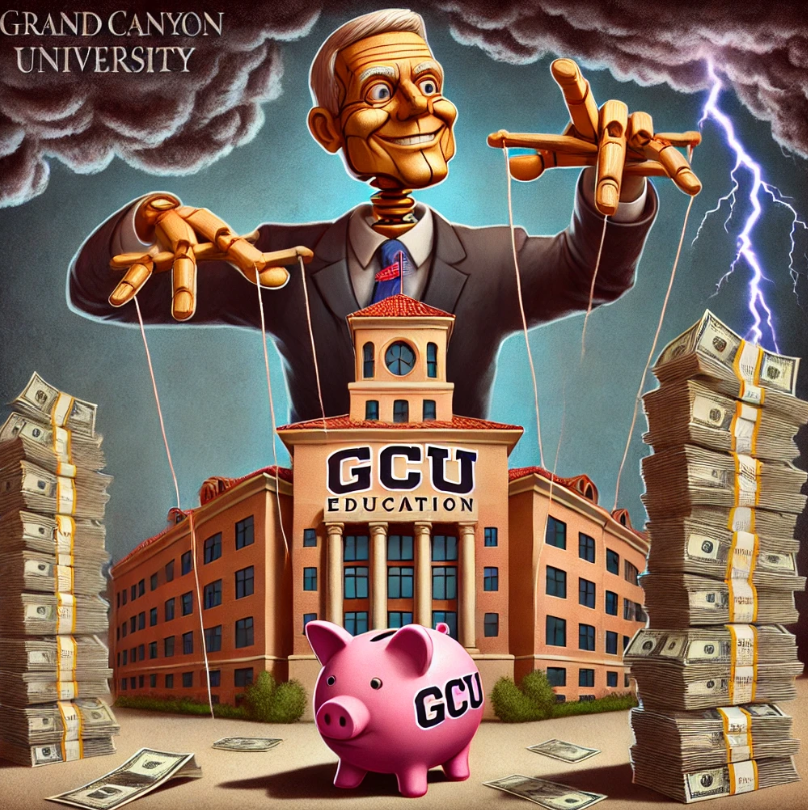GCU's Great Charade: The FTC and Everyone Else Finally Calls Out Mueller’s Mess

Let’s start with a truth no one can deny: Grand Canyon University (GCU) and Grand Canyon Education, Inc. (GCE) have been pulling a fast one for years, and the Federal Trade Commission (FTC) just filed an amended complaint on September 5, 2024, to remind everyone of that. Oh, and they didn’t forget about the ringleader either—CEO Brian E. Mueller. This isn't just a case of a little white lie; it's a full-blown deception of the highest order, targeting students under the guise of education and “nonprofit” status.
But let's not get ahead of ourselves. After all, a good scam takes time, right? The FTC is accusing GCU and GCE of violating both the FTC Act and the Telemarketing Act (Case No. 2:23-cv-02711-DWL), but more interestingly, this is after the U.S. District Court in Arizona gave them a free pass on some claims. Yes, Judge Dominic W. Lanza—another Trump appointee who once served as a U.S. Attorney—decided that not all of the FTC’s complaints held water. But like any good saga, the FTC is back, and this time, they’ve upped the ante.
Here's the kicker: GCU claims to be a nonprofit, but that’s nothing more than a fairy tale. The U.S. Department of Education already slapped them on the wrist, ruling that GCU is a glorified puppet for GCE. In this relationship, GCU plays the docile "nonprofit" while GCE, and of course Mueller, pull all the financial strings, making sure their shareholders cash in. The court put it bluntly: GCU is a “captive client,” nothing more than a cash cow disguised as an institution of higher learning. How altruistic of them, right?
Naturally, GCU wasn’t too thrilled about this ruling and ran straight to the Ninth Circuit Court of Appeals, where oral arguments were heard on January 24, 2024. As we wait for the Ninth Circuit’s decision, one can only imagine how much more damage GCU and GCE will cause while they twiddle their thumbs, hoping their fancy lawyers can spin their way out of this.
But wait—there’s more! The FTC isn’t just content to expose their nonprofit lie; they’re going after GCU for misleading doctoral students about the true costs of their programs. Surprise, surprise. GCU promised students a golden ticket to a Ph.D. but conveniently forgot to mention the skyrocketing fees, unnecessary credits, and lack of resources. In fact, several lawsuits, including Feehan v. Grand Canyon University (Case No. 0:24-cv-01172) and Tanner Smith, et al. v. Grand Canyon Education, Inc. (Case No. 2:2024cv01410), are echoing these claims. And just to add a cherry on top, Smith’s case includes racketeering claims. Yes, racketeering. It’s almost as if GCE’s business model was inspired by a mob movie.
At the heart of these cases is GCE’s slimy telemarketing scheme. Hundreds of so-called “counselors” were really just sales reps pretending to help prospective students while lining their own pockets. The FTC has plenty of dirt to back this up, thanks to plaintiffs who are all too familiar with GCE’s playbook. Let’s not forget GCE’s debt collection tactics either, where “student service counselors” are really just debt collectors in disguise. Sounds legit, right? Unfortunately, the FTC hasn’t taken up this particular point in their complaint—yet. But give it time.
While the FTC squares off with GCU, Matthew Feehan—a tenacious pro se litigant—continues his own legal crusade against GCE at the Fourth Circuit Court of Appeals. His case may not have the FTC’s muscle behind it, but Feehan’s claims mirror many of the same issues the FTC is targeting: the for-profit charade and the exploitation of doctoral students. Feehan might not have the backing of a government agency, but he’s not backing down either.
Now, for those keeping score at home, it’s important to remember that GCU and GCE are, legally speaking, two separate entities. But don’t be fooled. This legal distinction is nothing more than a convenient loophole designed to confuse the public and perpetuate the myth of GCU’s nonprofit status while GCE rakes in the profits behind the scenes. It’s a brilliant con if you’re into that sort of thing.
So, what’s the takeaway? The FTC, Smith, and Feehan are all determined to bring down this house of cards, and rightfully so. Whether it’s the blatant misrepresentation of GCU’s status or the deceptive practices targeting students, it’s clear that GCU and GCE have perfected the art of the hustle. While their legal battles may be fought on different fronts, the end goal is the same: expose the truth behind Mueller’s empire of deception. And with any luck, the courts will see through the smoke and mirrors and hold them accountable for the damage they've done to countless students and consumers across the country.
Let’s dive into what liability of overpayment means and how it plays into Matthew Feehan’s claims against Grand Canyon University (GCU). Spoiler alert: it’s not just another example of GCU trying to weasel its way out of a legal responsibility—it’s them trying to dump their liabilities on a disabled veteran. Classy, right?
Feehan, himself a law graduate and regulatory expert, is taking GCU to task for attempting to transfer the financial liability of an overpayment by the VA onto him—despite the fact that he didn’t attend the semester in question. This isn’t some vague legal gray area either. The Code of Federal Regulations (CFR) has made it abundantly clear that educational institutions are not permitted to transfer the liability of VA overpayments to students who did not attend or complete a semester. Feehan is simply fighting for what’s already been settled law.
What Liability of Overpayment Really Means
In the world of education financing, institutions like GCU receive payments from third parties like the U.S. Department of Veterans Affairs (VA) or the Department of Education (ED) under Title IV. When a student doesn’t complete a semester, the institution is required to return a proportionate amount of that payment based on the student’s attendance. Yes, shocking as it may seem to GCU, the entire lump sum isn’t owed if the student doesn’t attend.
Under 34 CFR § 668.22, which covers the Return of Title IV funds, if a student withdraws or stops attending classes, the institution must refund the unearned portion of the funds. The amount they refund is tapered depending on how much of the semester the student actually completed. This isn’t some obscure legal doctrine either—it’s standard practice.
Let’s break it down even further with a chart for those who need the basics:
- 0-10% of semester attended: The institution must return nearly 100% of the funds.
- 10-25%: About 75-90% of the funds are returned.
- 25-50%: The institution keeps some, but has to return 50-75%.
- 50%+: The institution may keep most of the funds.
Feehan didn’t attend the semester. That means GCU should’ve refunded the full amount to the VA, end of story. But of course, GCU tried to pull a fast one—insisting that Feehan should be on the hook for the entire overpayment, despite the fact that he didn’t even step foot in a classroom.
The VA-School Relationship vs. ED-School Relationship
Here’s where Feehan’s expertise really shines. He’s making the argument that the VA-school relationship regarding third-party liability is essentially the same as the ED-school relationship under Title IV. Both systems impose a similar requirement: when overpayments happen, the institution is responsible for returning the unearned portion—not the student.
Feehan’s legal claim is simple: if the Department of Education can’t dump its liabilities on students under Title IV, neither can the VA. And yet, GCU—showing the same moral compass they’ve displayed throughout this whole debacle—decided they were entitled to squeeze a disabled veteran for every penny. Feehan’s rightfully pushing back, determined to show the federal courts that the law is on his side.
GCU’s Debt Collection Tactics: Aggression and Harassment
GCU’s audacity doesn’t stop there. After dumping the liability of the overpayment onto Feehan, they didn’t wait around for the courts to decide—they unleashed their full arsenal of aggressive debt collection tactics on him and his family. We’re not talking about polite reminder letters here; GCU sent debt collectors who masqueraded as “student service counselors” (of course) to harass Feehan and even target his children. Yes, you read that right. His children.
The cherry on top? GCU's legal representatives had the nerve to threaten Feehan in full view of the district court during proceedings. Because when all else fails, why not bully the plaintiff in front of a judge, right?
But here’s the reality: GCU’s attempts to dodge its obligations and harass a disabled veteran aren’t just unethical—they’re illegal. Feehan isn’t just fighting for himself here. His case could set a precedent that stops institutions like GCU from pulling these kinds of stunts on other veterans in the future.
The Bigger Picture
At the end of the day, GCU’s actions aren’t just an isolated incident of bureaucratic incompetence—they’re part of a broader pattern of misconduct that shows just how little regard they have for the law or basic human decency. Feehan’s fight is shedding light on the way GCU has misled, mistreated, and harassed its students—all in the name of squeezing out a little extra profit.
So, what’s at stake? For GCU, it’s their ability to keep running this con. For Feehan, it’s about standing up for veterans and holding institutions accountable when they try to pull one over on people who deserve better.
This fight isn’t just about the liability of overpayment. It’s about stopping GCU and other for-profit schools from turning veterans into targets for their predatory practices. And if Feehan wins—and he should—it’ll be a serious blow to GCU’s dirty tactics and a victory for veterans everywhere.
Stay tuned—GCU’s charade might finally be coming to an end.

Member discussion